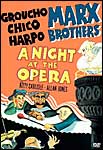|
Reviews of Recent Independent, Foreign, & Documentary Films in Theaters and DVD/Home Video
A NIGHT AT THE OPERA DVD Features: Commentary by critic Leonard Maltin. All-new documentary Remarks on Marx. Groucho
Marx on The Hy Gardner Show (1961 broadcast). Two vintage shorts: "Sunday Night at
the Trocadero" and Robert Benchley's Academy Award-winning “How to Sleep.” Trailer.
English, French, Spanish subtitles. DVD also available in colorized version.
The Marx Brothers’ sense of timing and their aura of random - though pointed - hilarity was what
made them stand out. With this understanding, Irving Thalberg, the legendary “wunderkind”
head of production at MGM, produced this 1935 film that - more than any of their
previous efforts, with the notable exception of their 1933 military satire Duck Soup -
transcends their vaudeville roots. Realizing they were at their best when juxtaposed against
establishment icons, or foiling authority figures such as Margaret Dumont, the writers situated
them assisting a couple of opera singers, the conventional romantic leads Kitty Carlisle and
Allan Jones, whom the brothers also help to advance in their singing careers. In this sparkling
digital transfer - remarkably clear for a movie over 70 years old - the team’s mix of low humor
and high culture are on abundant display. Additionally, each of the brothers reaches new
heights: Groucho, fearlessly breaking the fourth wall while managing not to sound as if he were
doing stand-up, and expanding the realm of address that other comedians, such as Woody Allen,
would later adapt; Chico’s sly accent humor, which influenced Mike Myers; and Harpo’s
physical wit, later channeled by both Jerry Lewis and Jim Carrey. Though its amazing
script cannot be emphasized enough, one aspect of this movie that is not discussed as much is its
direction by Sam Wood. Pacing is crucial to comedy, and Wood’s technique is remarkably
simple: his presence behind the camera is explicitly felt only when appropriate, such as a moment
when the humor consists of the way Harpo comes down a flight of stairs, when the film is
speeded up. Also, Wood refrains from cutting scenes too much, letting them build in many long
takes, such as the classic stateroom sequence. On a related note, a major fault of the film is its
seemingly endless musical interludes, which - though featuring great songs - bring the story to a
halt. DVD Extras: Maltin’s commentary, while insightful, is delivered in a tone of
voice so condescending that the critic almost sounds as if he is talking to a group of
kindergarteners. Nevertheless, his love for the material comes through, particularly as he explains
how Thalberg saw to it that they had surefire material - not only did he get the finest writers, but
he had the brothers test many of the comedic set pieces written for the film on the road. In this
way, explains Maltin, the brothers could throw out the gags that did not work, as well as time the
ones that did, and to milk as many laughs as they could out of them – which, according to the critic,
accounts for many of the pauses in the dialogue; this was not dead air, it was designed to give the
audience time to laugh. Also illuminating is Maltin’s discussion of how references to Italy during
World War II were cut from film prints when they were sent to troops overseas. The Remarks
on Marx documentary accumulates many facts as to how the brothers worked, and features
interviews with such Marx collaborators as Carlisle and screenwriter Irving Brecher, along with
more contemporary figures like Carl Reiner and Dom DeLuise, the latter painfully attempting to
be funny. A clip of Groucho on The Hy Gardner Show is too brief, and features him
telling the same anecdote about a prank played on Thalberg that is also
recounted in the documentary. And finally, the vintage shorts are not funny and hopelessly out of
date. Reymond Levy
|
